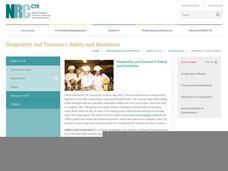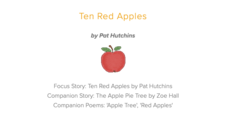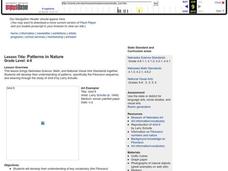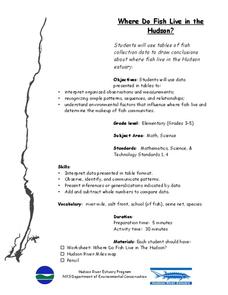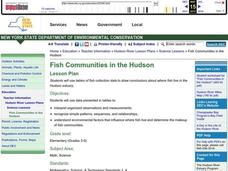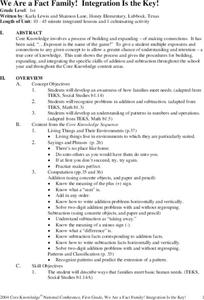National Research Center for Career and Technical Education
Hospitality and Tourism 1: Safety and Sanitation
Math and science come alive in this career-related lesson on sanitation. Along the way, learners explore bacterial growth rates using exponential notation and graphs. A link to a very brief, but vivid video shows just how quickly these...
Ahisma Summer Institute
The Power of One - Math in a Different Angle
In this 2-day lesson focused on exponents, middle schoolers will cross the curriculum by engaging in science, history and language arts activities. Exponential growth will be explored using grains of rice on a chess board. Exponential...
Curated OER
The Human Body
Explore the human body through hands-on activities. Young learners will trace their bodies and place cut out body organs in the proper place, print patterns using cut fruit, sing songs about good nutrition, and use their five senses...
Curated OER
Ten Red Apples; The Five Senses
A clever lesson designed around an apple awaits your learners. Descriptive words are used to explain what they believe is inside a bag while using their five senses. Students read the story The Apple Pie Tree and are introduced to the...
Curated OER
I Am Golden
Middle schoolers become familiar with patterns, the Fibonacci Sequence, and the Golden Ratio. They see how many places these occur. They have practical applications for using the calculator and making charts to extend patterns.
Curated OER
Which Fish Where?
Here is a activity outline that prompts elementary students to graph and analyze data regarding fish caught along the Hudson River. They will review vocabulary and complete 2 worksheets which can be accessed by clicking on the provided...
Curated OER
Ants
Young scholars make sequential patterns by using ants and following the model. They identify different parts of an ant by matching the picture to the word name. Pupils identify the ant's life cycle by creating a chart using pictures.
Curated OER
Proportionality: Modeling the Future
Students explore and examine how patterns, measurement, ratios and proportions are utilized in the research development and production of airplanes. They meet a pilot from the Federal Aviation Association who describes the growth of air...
NASA
Benford's Law
In this Benford's Law learning exercise, high schoolers read about the first digit frequency of numbers. Students solve 3 problems about sunspot numbers, solar wind magnetism and the depth of the latest earthquakes by using on line sites...
Curated OER
Patterns in Nature
Students learn about artist Larry Schulte and view examples of his work. They create addition sentence for the first seven numbers of the fibonacci sequence and use unifix cubes to build that sentences. Students color and create three...
Curated OER
Fish Communities in the Hudson
Learning to read data tables is an important skill. Use this resource for your third, fourth, or fifth graders. Learners will will study tables of fish collection data to draw conclusions. The data is based on fish environments in the...
Curated OER
What Does It Matter?
Students define matter, the chemical properties of matter, and the physical properties of matter. They name physical and chemical properties of matter (by classifying using a Tree Map). Students determine the mass, volume, and density of...
Curated OER
Finding Fibonacci
Students study and apply the Fibonacci numbers and how they occur in nature. Students solve problems using the Fibonacci numbers.
Curated OER
Fibonacci Numbers
Students calculate the Fibonacci sequence of numbers. Through the use of Fibonacci numbers in flowers, leaves, fruits, vegetables, pine cones, and other forms of nature; students explore how Fibonacci numbers occur in nature. Then they...
Spectrum
Grade 5 Standardized Test Prep
Here you'll find a great sampling of practice standardized test questions organized into four sections: ELA, mathematics, social studies, and science. Help your learners become familiar with the types of multiple-choice questions...
Curated OER
Where Do Fish Live in the Hudson?
Students explore the environmental factors that influence where fish live and determine the makeup of fish communities in the Hudson. They interpret guided observations and measurements to assess patterns, sequences and relationships.
Curated OER
Fish Communities in the Hudson
Students use tables of fish collection data to draw conclusions about where fish live in the Hudson Estuary. Given available data they interpret organized observations and measurements and recognize simple patterns, sequences, and...
Curated OER
Deer Tracks
Young scholars use satellite images to track to movement patterns of deer and examine deer behavior. They write stories about a day in the life of a field scientist.
Curated OER
Global Greenup
Students utilize satellite images to track the life cycle of vegetational growth over a large area. Animal migratory patterns are compared to this cycle.
Curated OER
Time and Cycles - Dendrochronology
Students investigate the lives of trees by examining ring cycles. For this plant life lesson, students identify the field of study known as dendrochronology and discover its history. Students investigate a simulated tree ring...
Curated OER
We Are a Fact Family! Integration Is the Key!
Students practice addition and subtraction. In this fact families unit, students practice finding sums and differences for fact families. This unit includes ten lessons with science and social studies integration.
Curated OER
Sowing Seeds: the Beginning of the Fast Plant Life Cycle
Young scholars plant seeds, observe and tend plants. They identify major plant parts, how to germinate and troubleshoot problems with plants; and, that plants need water, light, and soil nutrients to thrive. They create a Plant Growth...
Curated OER
Let Us Be Sensible
Students describe the five senses. They perform an investigation using sensory organs associated with each of the senses. Students identify, describe and extend repeating relationship (pattern) found in common, objects, sounds and...
Curated OER
Reading Trees: Understanding Dendrochronology
Students examine tree-ring dating and discuss the lack of water the settlers in Jamestown faced. They create paper tree rings, simulate rain patterns, and describe the history of construction paper tree sequences.
